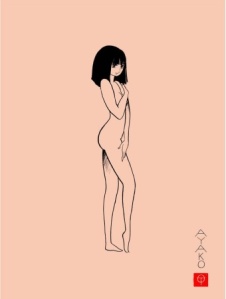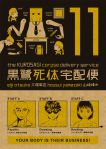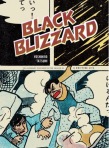 … to use this panel to illustrate a post. Any excuse at all.
… to use this panel to illustrate a post. Any excuse at all.
In this case, it’s because Melinda Beasi, Kate Dacey and I have formed our manga blogging battle robot to talk over the 12th and 13th volumes of Osamu Tezuka’s Black Jack (Vertical) over at Manga Bookshelf.
































Upcoming 2/2/2011
No one should be surprised by my Pick of the Week, should they? With that out of the way, I thought I’d take a look at two of the titles on this week’s crowded ComicList. (Okay, they aren’t confirmed on the list, but they’re probably already available through sources other than Diamond.)
Rikuo wants to emphasize his human heritage rather than his yokai legacy. He objects to the anti-human meanness of his prospective subjects, and he struggles to conceal his weird home life when he’s at school. Dangerous circumstances occasionally draw the yokai part of Rikuo to the forefront, and he becomes an assertive butt-kicker who bears at least a passing resemblance to InuYasha. This only serves to remind you that there’s better folklore-based manga out there for your perusal.
Even with a sprawling cast of frequently charming monsters at his disposal, Shiibashi can’t seem to devote much attention to them. He’s more interested in Rikuo’s secret-identity shenanigans, his generically flinty female friend, and the idiot rival who develops a boy-crush on Rikuo’s forceful alter ego. They’re a predictable group, as are their escapades. I’d much rather see what was happening at Rikuo’s yokai-packed family manse than follow this shônen-ready Marilyn Munster around.
For those who have forgotten, it’s about a traveling group of magicians who battle the zombies that have overrun their sort-of period, kind-of European country. Their leader and vocalist, a guy named Lucille, has dark secrets and likes to dress in drag. Their pianist, a girl named Eles, has a tragic past and disguises herself as a boy. Their companions are seedy, and the government line on their efforts is ambivalent on the best days.
In the second volume, Yuki seems to find both a more assured narrative rhythm and more underlying heft to her story. The back story she reveals about Lucille adds necessary layers to the character without undermining his essential ridiculousness. It also provides a strong, underlying subplot to fuel future stories.
Yuki’s penchant for the absurd and just slightly perverse is still on unapologetic display. Our protagonists go undercover in a convent, looking for a sacred relic and investigating the grisly murders of young nuns. This mini-arc is shaping up to be both creepy and very funny, provided you find secretive nuns committing and subjected to unexpected violence funny, which, I assure you, I do.
Grand Guignol Orchestra is still a bit on the bubble for me, but it’s sliding off of it and onto firmer ground. It’s not a singular kind of story, but Yuki’s work is as coherent as I’ve seen it while still displaying the quirkiness that’s made her a sort of superstar.
(Comments are based on review copies provided by the publisher. Nura is currently running in Shueisha’s Weekly Shônen Jump, and it’s up to about 14 volumes, so maybe it gets better. Grand Guignol Orchestra ran for five volumes in Hakusensha’s Bessatsu Hana to Yume.)
As for books that will be available through Diamond, the highlight has to be the 13th volume of Osamu Tezuka’s medical melodrama, Black Jack (Vertical). In the perfectly understandable excitement over Vertical’s announcement of the licensing of Tezuka’s Princess Knight, we shouldn’t forget this often gruesome, frequently moving, creepily funny classic.
Another excellent arrival is the 22nd volume of Hikaru no Go (Viz), written by Yumi Hotta and illustrated by Takeshi (Death Note, Bakuman) Obata. This marvelous series about a young man who dreams of becoming a great Go player ends with volume 23, I think, but it’s worth starting from the beginning if you haven’t yet done so.
I haven’t read the first volume yet, but various enthusiastic reviews have persuaded me that I need to catch up with Yuuki Fujimoto’s The Stellar Six of Gingacho (Tokyopop), second volume due Wednesday, about a group of kids, all children of local shopkeepers, who try and reestablish their waning friendship. In my defense, Tokyopop’s marketing is often confusing to me, and I’m never sure if I’m going to get The Secret Notes of Lady Kanoko or KimiKiss.